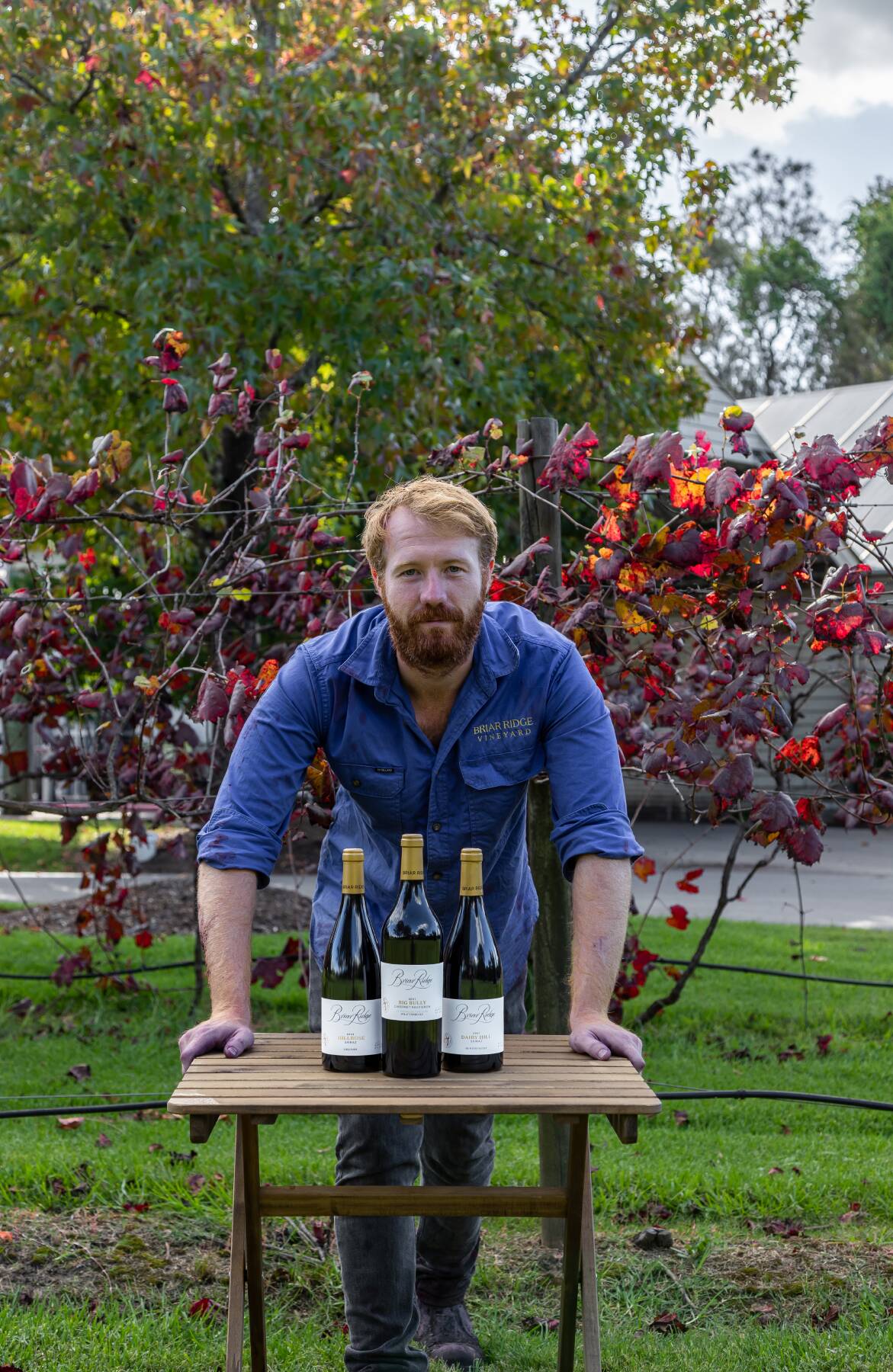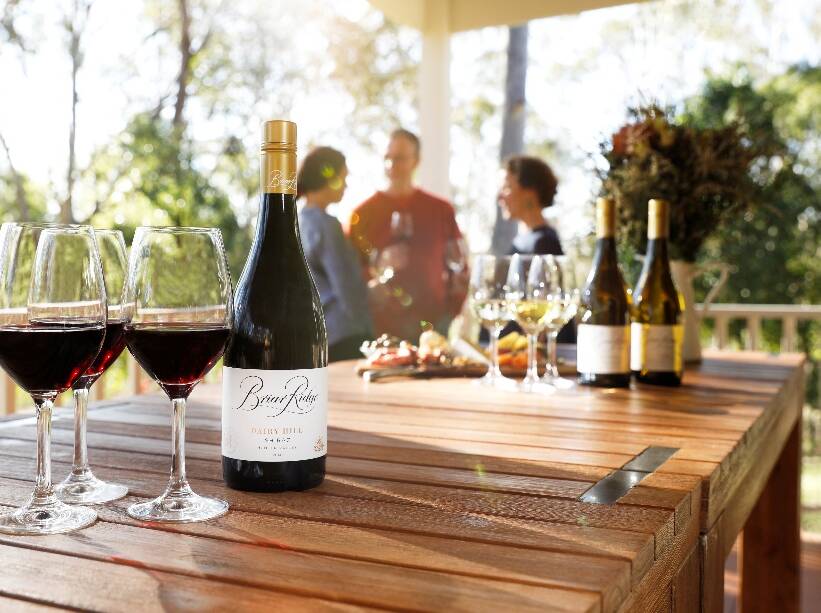
Alex Beckett is a rising star in the wine industry.
He is the chief winemaker at Briar Ridge Vineyard at Mount View in the Hunter Valley. The winery is owned by Jaclyn Davis, daughter of long-time Hunter Valley vineyard owner John Davis, who's flagship is Pepper Tree Wines.
IN 2022 Briar Ridge Estate's 2021 Albarino was named Best Other Wine in the nation by Halliday Wine Companion. Briar Estate holds a a5-star rating from Halliday.
Beckett has been Briar Ridge's winemaker since 2017, with Gwyn Olsen consulting (Olsen has moved to Henschke).
With the recent release of Briar Ridge's 2021 Single Vineyard Dairy Hill Shiraz, the 2021 Single Vineyard 'Big Bully' Cabernet Sauvignon and the 2022 Single Vineyard 'Hillrose' Shiraz, I put some questions to Beckett.
The critics love your whites, is that a different challenge than your reds?
It's definitely a different kind of challenge. For me, white wine production is about precision, when you work with the utmost attention to detail, the end goal can be clearly aligned with your intent as a winemaker. This means wines that are delicate and full of tension and purity.
Red wine production is complex by comparison, particularly when you choose to work in a minimalist way like we do at Briar Ridge. There are thousands of more compounds within red wines that can grow and develop in countless ways if you don't take absolute control, so what we do is risky, but results in wines that are interesting and compelling.
How do you describe the push to albarino, pinot gris, fiano?
This for us is a reflection of multiple things. Jaclyn's father John [Davis] has long experimented with new varietal plantings, an ever-changing quest to explore how varieties function in different conditions.
We also have a long-term plan to work in a more holistic farming fashion, so finding varieties that require fewer inputs is integral to this. Fiano and Albarino are key in that sense.
We as a team are passionate about diversity of expression, so that's certainly a driver.
Finally, we are always keen to express the innate link between food and wine, and these varieties are exceptionally well suited to the modern Australian dining culture.
The Single Vineyard red wines ring out about minimal intervention. Is that your style? Has it always been?
It is certainly my style, and it has not always been that way.
We are taught in university to follow the rules, create wines that appeal to technical perfection, and that was how I started out.
However, I've been fortunate in my career to explore the greatest wines of the world, and nothing is a quicker lesson about complexity than tasting a completely unaffordable wine from one of the great producers and thinking, 'why does this have so many wine faults?'. Over time, the thought process transitions to 'are they really faults, or do they bring complexity and interest to the wine?'.
Now my ethos is about allowing the wines to be a natural reflection of their site and vintage, sometimes that means they are rustic and complex, and other times they are pure and fruitful.
It's really a story of the wine, rather than a story of the winemaker.
You are drawing from Hilltops and Wrattonbully as well as the Hunter? Is that a sign of confidence in your abilities? Will you stay with the same vineyards? What future does the Hilltops investment hold? What else is coming down the pipeline from those vineyards?
I would say the choices to source from other regions are less linked to my abilities and more representative of our desire to explore more diverse expressions of varieties and styles we love.
We will always maintain at least 90 per cent Hunter Valley production (so long as the weather gods are kind). However, having access to some great vineyards in other locations means we get to have more fun, and the chance to create unique and interesting wines which can riff off each other.
We plan to stay with the same vineyards, as we have spent a great deal of time vetting our vineyard sources to ensure the quality and the farming practices are aligned with our views - and we are happy in that respect.
Hilltops has great potential for both Syrah and Cabernet. We are still seeking how best to let that vineyard shine, so time will be key.
We have some very small batch Chardonnay and Pinot coming from the Davis family-owned vineyard in Orange, at 860 meters above sea level, and are extremely excited by the potential of these wines in our portfolio.
What do hear when you have conversations with people who drink your wines? Any criticism of your wines? If so, do you pay any attention to that? Or how do you respond? On the other side, what is the most positive nature of comments you get - how do you translate that?

Everything and anything. This is why we make wine, because no two wines can possibly be the same, they all have their own unique stories and not every story is interesting to every drinker.
I was in London last week and consistently heard the same, 'These are the most interesting Hunter Valley Wines I have ever seen'. On the flip side, there are people who think the complete opposite, and that is 100 per cent ok. It's the reason why I'm in this industry.
If consumers are enjoying the experience of exploring flavours and textures, then I'm completely on board with whatever end of the spectrum they land.
Full interview @ newcastleherald.com.au.
In terms of translating positive comments, it's not about validation or perhaps even modification of style. The wines we make are made to speak of place over production, so for us, it's recognition of the quality of the farming that brings the validation. Are we farming the best we possibly can, to express these sites appropriately? That's the conversation these comments spark.
How do you know where you want a wine to go? How much is it a reflection of you, your taste, your values?
It's unavoidable to not make wines that reflect you in some way. I'm introverted, I like to spend quiet time by myself in the cellar or at home with my family, so our wines can also be very introverted. They are reticent and shy, but also delicate and complex because we handle them with the utmost care and allow them to naturally develop complexity. That being said, these wines as mentioned are about the site. So, in every instance, we taste the grapes first. What are they saying at this stage and how can we guide them into a state which best reflects and emphasises those qualities?
What was the turning point that got you into the wine industry?
I was studying a degree in Applied Linguistics and was working locally in cellar doors and vineyards to fund my 'lavish (2-minute noodles) lifestyle' and was fortunate to have a boss Richard Earnshaw at Tyrrell's who used to bring special bottles out for the staff to taste as a crew. The conversations about these wines then sparked a hunger to explore wine in all its forms.
You drink wine for a living. When you settle to enjoy wine, do you get more pleasure from wine on its own or wine with food?
Either really, as long as it's with others. I get my joy in the industry from talking about the wines I taste, hearing others' opinions, and then forming a full picture of that wine in my head through a complete narrative - sometimes food is important to this, and sometimes it's not.
Does wine with food experiences stick with you when you are making wine - I'd like a wine that does this? Does that?
Not really, to be quite honest. There are plenty of life-affirming food and wine experiences in the world, and they are important, but the wines we make are about expressing the site above all, so food is secondary to that.
You are working for a company that is working on increasing its brand presence, an up and comer if you will? What made you come to them? How much time do you spend in the other vineyards (SA, Hilltops)?
I like the commitment to exploration we have at Briar Ridge Vineyard. The world is ever-changing, the climate is shifting, and the growing conditions are changing; therefore, our practices need to evolve with those. The fact that Jaclyn Davis, and her family continue to push these boundaries and allow me to do the same in the winery is exciting and fills me with the drive to help build the brand into a new evolutionary stage. With not a great deal of time in the other vineyards, it's important to trust people in their roles, and we are fortunate to work with excellent farmers and vineyard managers who know their lands and farm them appropriately. I'm here to discuss how we could evolve vineyard management if necessary and more acutely involved at harvest, making decisions on grape maturity based on flavour and chemistry.
Winemakers determine trends, not drinkers: true?
I think it's both. Winemakers can be innovators, that's for sure, you only have to look at the emergence of the natural movement globally. However, ultimately drinkers are driven by their cultural tastes, and this determines the success of wine styles in the market.







